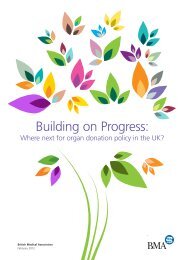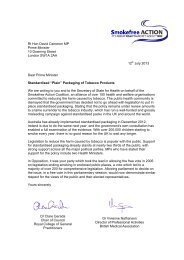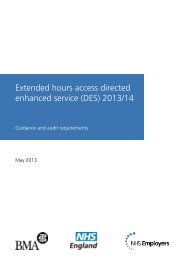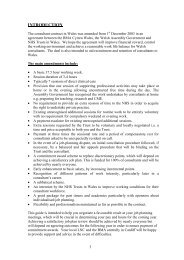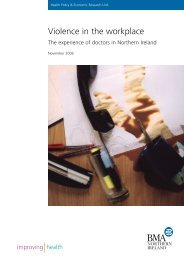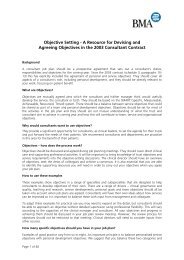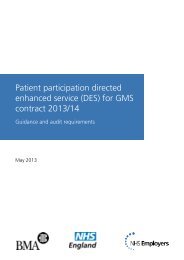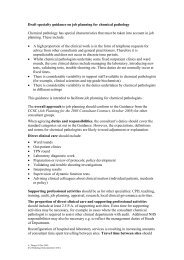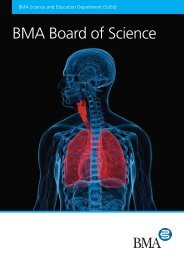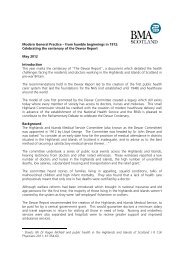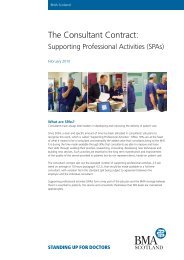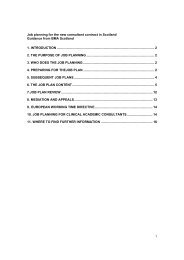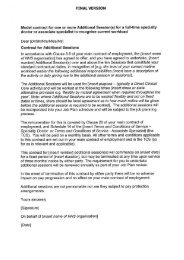The Consultant Contract and Job Planning for Emergency ... - BMA
The Consultant Contract and Job Planning for Emergency ... - BMA
The Consultant Contract and Job Planning for Emergency ... - BMA
Create successful ePaper yourself
Turn your PDF publications into a flip-book with our unique Google optimized e-Paper software.
<strong>The</strong> <strong>Consultant</strong> <strong>Contract</strong><br />
<strong>and</strong><br />
<strong>Job</strong> <strong>Planning</strong> <strong>for</strong> <strong>Emergency</strong> Medicine<br />
<strong>Consultant</strong>s<br />
September 2009
Contents<br />
Key Points 3<br />
1. Introduction 4<br />
2. <strong>The</strong> <strong>Consultant</strong> <strong>Contract</strong> 6<br />
3. <strong>Job</strong> <strong>Planning</strong> Principles 7<br />
4. Direct Clinical Care 8<br />
5. Supporting Professional Activity 9<br />
6. Additional NHS Responsibilities 11<br />
7. External Duties 12<br />
8. On-Call <strong>and</strong> Out Of Hours Working 13<br />
9. <strong>Emergency</strong> Medicine <strong>Job</strong> <strong>Planning</strong> in Practice 15<br />
10. Leave 20<br />
11. Pay 22<br />
12. Clinical Excellence Awards 23<br />
13. Revalidation, Appraisal <strong>and</strong> Continuing Medical Education 25<br />
14. Work Diaries 25<br />
15. Part Time Working 26<br />
16. <strong>Job</strong> Plan Review 28<br />
17. Private Practice 29<br />
18. Academic <strong>and</strong> Honorary <strong>Contract</strong>s 30<br />
Contributing Authors<br />
Appendix 1 - <strong>The</strong> 2003 <strong>Contract</strong> in Scotl<strong>and</strong><br />
Appendix 2 - <strong>The</strong> 2003 <strong>Contract</strong> in Wales<br />
Appendix 3 - Supporting Resources<br />
Appendix 4 - Implications of the Working Time Directive<br />
Appendix 5 – CEM statement about the role of the <strong>Consultant</strong> in EM ‘On-Call’<br />
Appendix 6 – Links to Useful Websites <strong>and</strong> Documents<br />
31<br />
<strong>The</strong> <strong>Consultant</strong> <strong>Contract</strong> <strong>and</strong> <strong>Job</strong> <strong>Planning</strong> <strong>for</strong> <strong>Emergency</strong> Medicine <strong>Consultant</strong>s 2/40
Key Points<br />
• <strong>The</strong> 2003 consultant contract is time based<br />
• <strong>The</strong> contract allows transparency <strong>and</strong> an ability to match work that<br />
you agree to do, to pay <strong>and</strong> to the resources you need to deliver<br />
the work<br />
• <strong>The</strong> job plan should be based on a robust diary exercise<br />
• It is vital that you have (at least) an annual job plan review <strong>and</strong> that<br />
you use your annual appraisal to feed into this<br />
• You should not sign a contract without an agreed job plan<br />
• Supporting resources should be agreed be<strong>for</strong>e agreeing a job plan<br />
• This is a 10 PA contract. PAs over 10 are neither obligatory nor<br />
permanent<br />
• Up to 10 PAs are pensionable<br />
• A PA in normal working hours is 4 hours<br />
• A PA outside normal working hours is usually 3 hours<br />
• Scheduled work in premium time is not usually compulsory <strong>and</strong><br />
compensation <strong>for</strong> such work is negotiable<br />
• Time spent on emergency work includes travel time<br />
• All activities related to direct clinical care should be identified<br />
• If workload changes, ask <strong>for</strong> a job plan review<br />
• <strong>The</strong>re is specific provision <strong>for</strong> part time contracts.<br />
<strong>The</strong> <strong>Consultant</strong> <strong>Contract</strong> <strong>and</strong> <strong>Job</strong> <strong>Planning</strong> <strong>for</strong> <strong>Emergency</strong> Medicine <strong>Consultant</strong>s 3/40
1. INTRODUCTION<br />
<strong>The</strong> 2003 <strong>Consultant</strong> <strong>Contract</strong><br />
This document will give <strong>Emergency</strong> Medicine consultants a broad overview of the<br />
principles of the 2003 contract together with specific advice appropriate <strong>for</strong><br />
<strong>Emergency</strong> Medicine consultants. <strong>The</strong> objective is to enable <strong>Emergency</strong> Medicine<br />
consultants <strong>and</strong> thus their patients, to work within <strong>and</strong> benefit from the 2003 contract.<br />
In view of the differences in contract between each of the UK nations we have aimed<br />
to cover the general principles with details based on the English contract <strong>and</strong> then to<br />
highlight specific differences <strong>for</strong> other nations.<br />
This document is based, with permission, upon the 2005 guidance published by the<br />
Association of Anaesthetists of Great Britain <strong>and</strong> Irel<strong>and</strong>. We gratefully acknowledge<br />
the generosity of the AAGBI in allowing us to benefit from their work.<br />
<strong>The</strong> appended list of references <strong>and</strong> web links will allow members to access more<br />
complex <strong>and</strong> detailed in<strong>for</strong>mation on various topics from other sources (see<br />
Appendix 6).<br />
This document will also be available on the <strong>BMA</strong> website <strong>and</strong> will be updated as<br />
necessary to provide members with an ongoing <strong>and</strong> up to date source of reference.<br />
<strong>The</strong> majority of consultants in Engl<strong>and</strong> <strong>and</strong> Scotl<strong>and</strong> have now transferred to the<br />
2003 contract. All consultants appointed since 2003 have contracts on this basis.<br />
<strong>The</strong> contract identifies what consultants have agreed to do <strong>and</strong> the payment <strong>for</strong><br />
those agreed activities. Although this is a national contract there are aspects that<br />
need local interpretation <strong>and</strong> several instances where a ‘departmental’ approach will<br />
be of benefit. For the first time, objectives <strong>for</strong> consultants <strong>and</strong>, importantly, the<br />
supporting resources necessary to deliver these objectives, are identified within the<br />
contract. A previous <strong>BMA</strong> survey suggested that a number of consultants did not<br />
have job plans. A thorough underst<strong>and</strong>ing of the new contract <strong>and</strong> the job planning<br />
process is thus important <strong>for</strong> all consultants to ensure a proper work-life balance.<br />
<strong>Emergency</strong> Medicine Sub-committee<br />
<strong>The</strong> British Medical Association maintains close relations with the College of<br />
<strong>Emergency</strong> Medicine through the EM subcommittee of the Central <strong>Consultant</strong>s &<br />
Specialists Committee <strong>and</strong> the Professional St<strong>and</strong>ards Committee (PSC) of CEM<br />
which both have cross representation between CEM <strong>and</strong> <strong>BMA</strong>.<br />
This document is a result of close collaboration between <strong>BMA</strong> <strong>and</strong> CEM via these<br />
two committees.<br />
Comments or suggestions may be addressed to either committee.<br />
<strong>The</strong> Old (Pre-2003) <strong>Contract</strong><br />
Some <strong>Emergency</strong> Medicine consultants have chosen to remain on the pre-2003<br />
contract, at least <strong>for</strong> the present. For these consultants may wish to read the <strong>BMA</strong><br />
publication entitled:<br />
“Controlling workload, maximising rewards – guidance <strong>for</strong> consultants -May 2003.”<br />
<strong>The</strong> <strong>Consultant</strong> <strong>Contract</strong> <strong>and</strong> <strong>Job</strong> <strong>Planning</strong> <strong>for</strong> <strong>Emergency</strong> Medicine <strong>Consultant</strong>s 4/40
Professional Advice on Your <strong>Contract</strong><br />
<strong>The</strong> <strong>BMA</strong> publishes comprehensive advice on the 2003 <strong>and</strong> pre-2003 consultant<br />
contracts, with answers to ‘frequently asked questions’. Some of this in<strong>for</strong>mation is<br />
available to all, some is restricted to members.<br />
NHS Employers also has a website which is worth visiting even though many areas<br />
are not agreed with the profession.<br />
It is important to balance the professional organisation’s views on contentious areas<br />
with those of NHS Employers. <strong>The</strong>se views will be conflicting in some areas. Where<br />
this bears on your own job you should seek personal professional advice.<br />
<strong>The</strong> <strong>Consultant</strong> <strong>Contract</strong> <strong>and</strong> <strong>Job</strong> <strong>Planning</strong> <strong>for</strong> <strong>Emergency</strong> Medicine <strong>Consultant</strong>s 5/40
2. THE CONSULTANT CONTRACT<br />
What is the contract?<br />
A contract is a set of statements governing the agreement between you <strong>and</strong> your<br />
employer: what work you agree to per<strong>for</strong>m, what facilities your employer agrees to<br />
make available <strong>for</strong> you to do this work, <strong>and</strong> what your employer agrees to reward<br />
you with <strong>for</strong> your work. It must be both fair <strong>and</strong> compatible with the law.<br />
<strong>The</strong> consultant contract is not a single document. It has several components:<br />
• <strong>The</strong> Statement of particulars (called the contract)<br />
• <strong>The</strong> terms <strong>and</strong> conditions of service<br />
• <strong>The</strong> job plan.<br />
<strong>The</strong> <strong>Contract</strong> (Statement of Particulars)<br />
This is usually a document that states your job title, your employing organisation <strong>and</strong><br />
further details <strong>and</strong> ends with a place where you <strong>and</strong> your employer sign. It is<br />
negotiated nationally <strong>and</strong> should not be varied locally, except where your own<br />
particular circumstances have been inserted. Details of the contract <strong>for</strong> individual<br />
countries can be found on the <strong>BMA</strong> website.<br />
<strong>The</strong> Terms <strong>and</strong> Conditions of Service<br />
This is a set of rules describing how the contract operates in more detail. <strong>The</strong> rules<br />
are congruent with the statement of particulars.<br />
Employers do not usually circulate these unless on request; you can find them on the<br />
Departments of Health websites. <strong>The</strong>y are negotiated nationally, <strong>and</strong> should not be<br />
varied locally except where a collective agreement has been reached with the Local<br />
Negotiating Committee <strong>for</strong> medical <strong>and</strong> dental staff in your trust. Examples of such<br />
agreements might be to vary the provisions on additional programmed activities in<br />
the case of significant private practice, to confirm arrangements <strong>for</strong> fee paying<br />
services 1 or to agree appropriate places <strong>for</strong> supporting professional activities.<br />
<strong>The</strong> <strong>Job</strong> Plan<br />
This is your personal <strong>and</strong> detailed agreement about your work. <strong>The</strong> job plan is<br />
congruent with the terms <strong>and</strong> conditions of service. It will describe the purpose of<br />
your job, your work timetable, your objectives <strong>and</strong> the supporting resources, which<br />
should be allocated to help you achieve them. It should include any other personal<br />
agreements about the way you work.<br />
1 Previously referred to as “category 2 work” Fee Paying Services are services that are not part of <strong>Contract</strong>ual or<br />
Consequential Services <strong>and</strong> not reasonably incidental to them, e.g. medico-legal work <strong>and</strong> writing police<br />
statements. Examples are now listed in schedule 10 of the English contract<br />
<strong>The</strong> <strong>Consultant</strong> <strong>Contract</strong> <strong>and</strong> <strong>Job</strong> <strong>Planning</strong> <strong>for</strong> <strong>Emergency</strong> Medicine <strong>Consultant</strong>s 6/40
Underlying Principles of the <strong>Contract</strong><br />
<strong>The</strong> contract is a professional contract that is, <strong>for</strong> the first time, clearly time based.<br />
This does not mean it promotes a strict “clock-watching” mentality, but it does give<br />
consultants a clear ability to resist escalations in working hours <strong>and</strong> to be properly<br />
rewarded <strong>for</strong> work they agree to do.<br />
<strong>The</strong> “unit of currency” of the contract is the Programmed Activity (PA), <strong>and</strong> a<br />
consultant’s work is expressed in numbers of PAs.<br />
Each programmed activity (PA) worked between 7am <strong>and</strong> 7pm Monday to Friday,<br />
excluding bank holidays, is a period of 4 hours. Outside this time, one PA is normally<br />
3 hours long. <strong>The</strong> whole-time contract is <strong>for</strong> ten PAs; consultants may agree to work<br />
fewer than ten (part-time) or more than ten (extra PAs).<br />
3. JOB PLANNING PRINCIPLES<br />
<strong>The</strong> 2003 contract is time based; the job plan should there<strong>for</strong>e be supported by a<br />
robust work diary.<br />
Working time is divided into four components:<br />
1. Direct Clinical Care (DCC)<br />
2. Supporting Professional activities (SPA)<br />
3. Additional NHS responsibilities<br />
4. External duties.<br />
<strong>The</strong> st<strong>and</strong>ard full time job plan comprises 10-programmed activities, generally 7.5<br />
(30 Hours 2 ) <strong>for</strong> direct clinical care <strong>and</strong> 2.5 (10 Hours 2 ) <strong>for</strong> supporting professional<br />
activities.<br />
Extra (sometimes described as additional) programmed activities may be agreed <strong>for</strong><br />
direct clinical care, but these do not <strong>for</strong>m part of the st<strong>and</strong>ard contract <strong>and</strong> above a<br />
total of10 PAs are not superannuable. In many areas of the country employers have<br />
a ceiling on the number of extra PAs, which they will agree to pay. In the event of<br />
this happening, consultants should not agree job plans that they know would involve<br />
working in excess of work paid <strong>for</strong>.<br />
2 If any PA or part PA is worked in premium time (7pm-7am or at weekend), a PA is usually 3 hours not 4 hours<br />
<strong>The</strong> <strong>Consultant</strong> <strong>Contract</strong> <strong>and</strong> <strong>Job</strong> <strong>Planning</strong> <strong>for</strong> <strong>Emergency</strong> Medicine <strong>Consultant</strong>s 7/40
4. DIRECT CLINICAL CARE (DCC)<br />
<strong>The</strong> Terms <strong>and</strong> Conditions of Service define Direct Clinical Care as “work directly<br />
relating to the prevention, diagnosis or treatment of illness”.<br />
A number of types of work are listed as falling within this category:<br />
• <strong>Emergency</strong> duties<br />
• Operating sessions (including pre-operative <strong>and</strong> post-operative care) ward<br />
rounds<br />
• Outpatient activities<br />
• Clinical diagnostic work<br />
• Other patient treatment<br />
• Public health duties<br />
• Multi-disciplinary meetings about direct patient care<br />
• Administration directly related to the above (including but not limited to referrals<br />
<strong>and</strong> notes).<br />
Some of these types of work such as operating sessions are not relevant to most<br />
<strong>Emergency</strong> Medicine <strong>Consultant</strong>s most of whom have a working week based on<br />
departmental “shop floor” <strong>and</strong> other related clinical duties.<br />
Of the categories above, clinical diagnostic work probably best describes the<br />
majority of an <strong>Emergency</strong> Medicine <strong>Consultant</strong>’s work. Examples of DCC:<br />
• Clinical Diagnostic work – scheduled “Shop Floor” duties <strong>and</strong> unscheduled<br />
clinical work carried out during on-call, on an ad-hoc basis or as late finishes<br />
• Ward rounds on CDU/Observation or Short Stay Wards<br />
• Review clinics – outpatient clinics<br />
• Multi-disciplinary meetings about direct patient care<br />
• Administration related to patient care (e.g. referrals, notes, dictation,<br />
correspondence)<br />
• H<strong>and</strong>ling complaints<br />
• Morbidity/mortality meetings<br />
• Managing equipment <strong>and</strong> drugs in the ED<br />
• Travel: to <strong>and</strong> from home <strong>for</strong> on-call work <strong>and</strong> between sites<br />
• Other patient treatment, e.g. Intensive care or other subspecialty work.<br />
In the new contract, <strong>for</strong> the first time, travel time can be counted when calculating on<br />
call emergency time. <strong>The</strong> total emergency episode time should be calculated as the<br />
time from the first telephone call relating to the episode to arriving home after the<br />
event. Travel time between hospitals within a Trust during the course of the working<br />
day, both <strong>for</strong> DCC <strong>and</strong> SPA, can also be counted.<br />
<strong>The</strong> <strong>Consultant</strong> <strong>Contract</strong> <strong>and</strong> <strong>Job</strong> <strong>Planning</strong> <strong>for</strong> <strong>Emergency</strong> Medicine <strong>Consultant</strong>s 8/40
5. SUPPORTING PROFESSIONAL ACTIVITY (SPA)<br />
In the English <strong>and</strong> Scottish contracts, the time allowed <strong>for</strong> this should average 10<br />
hours a week (2.5 PAs).<br />
<strong>The</strong> 2003 contract states that <strong>for</strong> full time consultants the <strong>Job</strong> Plan will typically<br />
include an average of 7.5 Programmed Activities <strong>for</strong> Direct Clinical Care duties <strong>and</strong><br />
2.5 Programmed Activities <strong>for</strong> Supporting Professional Activities.<br />
Here the “average” refers to the weekly time allocation <strong>for</strong> an individual consultant<br />
NOT to an average across a group of consultants. In other words some weeks could<br />
have fewer than 10 hours of SPA time <strong>and</strong> some weeks more provided that the<br />
average was 10 hours.<br />
“Typically” means that this will be the default position although some consultants<br />
may require more SPA time (<strong>for</strong> example if undertaking a role such as clinical<br />
director). <strong>The</strong> College of <strong>Emergency</strong> Medicine advises that every consultant requires<br />
a minimum of 1PA <strong>for</strong> CPD <strong>and</strong> the requirements of revalidation.<br />
<strong>The</strong>re are a number of non-clinical requirements that every <strong>Emergency</strong> Department<br />
will have regardless of size <strong>and</strong> these may increase in larger departments. <strong>The</strong><br />
College’s recommendations <strong>for</strong> these departmental non-clinical requirements are as<br />
follows:<br />
Clinical Director 3PAs /week<br />
Teaching organisation 2PAs /week<br />
(up to 4 in large teaching departments)<br />
Educational support 1PA per four trainees/week<br />
Clinical Governance lead 1PA/week<br />
Contingency <strong>Planning</strong> lead 1PA/week<br />
<strong>Emergency</strong> Care network duties 1PA/week<br />
In addition <strong>Emergency</strong> Medicine consultants will need to participate in many other<br />
non-clinical activities including departmental administration <strong>and</strong> management, liaison<br />
with other specialties <strong>and</strong> departments, teaching <strong>and</strong> teaching preparation, service<br />
development <strong>and</strong> quality improvement work, audit <strong>and</strong> appraisal.<br />
To fulfil these requirements, full time <strong>Emergency</strong> Medicine consultants should have a<br />
minimum of 2.5PAs <strong>for</strong> supporting professional activities.<br />
In departments with four consultants or fewer, the departmental non-clinical<br />
requirements are such that each may need more than 2.5 PAs of SPA time to ensure<br />
a safe <strong>and</strong> quality service is delivered.<br />
In unusual circumstances a consultant may wish to contract <strong>for</strong> fewer than 2.5 SPAs<br />
- but beware of the effect on appraisal <strong>and</strong> revalidation <strong>and</strong> on quality of care given<br />
to patients.<br />
<strong>The</strong> <strong>Consultant</strong> <strong>Contract</strong> <strong>and</strong> <strong>Job</strong> <strong>Planning</strong> <strong>for</strong> <strong>Emergency</strong> Medicine <strong>Consultant</strong>s 9/40
Examples of SPA<br />
• Continuing professional development (i.e. all regular activity such as reading<br />
journals, attending regular professional or academic meetings etc.)<br />
• Appraisal<br />
• Teaching organization<br />
• Training (e.g. of trainees, medical students)<br />
• External teaching <strong>and</strong> education delivery (e.g. ATLS, APLS)<br />
• Formal teaching <strong>and</strong> preparation (e.g. giving lectures, seminars)<br />
• Audit <strong>and</strong> local clinical governance activity<br />
• Clinical management<br />
• Service development <strong>and</strong> quality improvement work<br />
• Major incident planning<br />
• Rota organization<br />
• <strong>Job</strong> planning<br />
• Research.<br />
This list is by no means exhaustive.<br />
<strong>The</strong> <strong>Consultant</strong> <strong>Contract</strong> <strong>and</strong> <strong>Job</strong> <strong>Planning</strong> <strong>for</strong> <strong>Emergency</strong> Medicine <strong>Consultant</strong>s 10/40
6. ADDITIONAL NHS RESPONSIBILITIES<br />
Some consultants may have additional NHS responsibilities that cannot be absorbed<br />
into the time normally set aside <strong>for</strong> SPAs. <strong>The</strong>se should be recognised in the job<br />
plan <strong>and</strong> remunerated accordingly. It may be appropriate <strong>for</strong> them to replace some<br />
of the DCC Pas.<br />
Examples:<br />
• Medical director<br />
• Clinical director<br />
• Lead clinician<br />
• Other official trust management roles<br />
• Audit lead<br />
• Clinical governance lead<br />
• Risk management lead<br />
• Teaching or research lead<br />
• Subspecialty lead<br />
• Project lead<br />
• Equipment officer.<br />
In many trusts, medical management positions are classified <strong>and</strong> remunerated<br />
separately to the consultant contract as a “responsibility payment”. <strong>The</strong>se payments<br />
may in some circumstances be pensionable <strong>and</strong> advice should be sought as to<br />
whether this is beneficial or not <strong>for</strong> the individual concerned. This means that one<br />
would have a separate contract covering such work with a remuneration that might<br />
bear no relation to the consultant salary. This almost always applies to medical<br />
directors <strong>and</strong> sometimes to clinical director <strong>and</strong> some other posts.<br />
Whichever type of contract a medical manager has, it is important to make sure that<br />
the duties of the medical manager, the supporting facilities <strong>and</strong> the remuneration <strong>for</strong><br />
those duties are clearly specified.<br />
<strong>The</strong> <strong>Consultant</strong> <strong>Contract</strong> <strong>and</strong> <strong>Job</strong> <strong>Planning</strong> <strong>for</strong> <strong>Emergency</strong> Medicine <strong>Consultant</strong>s 11/40
7. EXTERNAL DUTIES<br />
<strong>The</strong>se activities are deemed to be <strong>for</strong> the greater good of the NHS. <strong>The</strong> DH<br />
recognises their value <strong>and</strong> has given implicit support <strong>for</strong> such activities.<br />
“It remains, however, the policy of the Department of Health to encourage NHS<br />
organisations to release consultants <strong>for</strong> work that is necessary <strong>for</strong> the broader<br />
benefit of the NHS.” <strong>Consultant</strong> <strong>Contract</strong> Implementation Team (CCIT) update 14<br />
January 2004<br />
Examples:<br />
• Acting as an external member of an advisory appointments committee<br />
• Work <strong>for</strong> other NHS bodies (e.g. Health Commission)<br />
• College tutor<br />
• Work <strong>for</strong> the General Medical Council or other national bodies<br />
• NHS disciplinary procedures<br />
• Regional advisor, deputy, programme director etc.<br />
• Trades union activities (e.g. <strong>BMA</strong>)<br />
• College work<br />
• University roles.<br />
If these activities are regular then allowance should be made <strong>for</strong> them within the <strong>Job</strong><br />
Plan. Less regular activities may be better h<strong>and</strong>led using paid special leave (TCS<br />
schedule 18), which simply replaces one’s duties <strong>for</strong> the day in question.<br />
<strong>Consultant</strong>s should discuss their needs <strong>and</strong> the employer’s usual way of h<strong>and</strong>ling<br />
them as soon as possible. <strong>Emergency</strong> Medicine consultants may be in a position to<br />
agree flexible elements to their workload so that their absence from the workplace is<br />
easier to cover.<br />
<strong>The</strong> <strong>Consultant</strong> <strong>Contract</strong> <strong>and</strong> <strong>Job</strong> <strong>Planning</strong> <strong>for</strong> <strong>Emergency</strong> Medicine <strong>Consultant</strong>s 12/40
8. ON-CALL AND OUT OF HOURS WORKING<br />
Premium Time Working<br />
Increasing numbers of <strong>Emergency</strong> Medicine <strong>Consultant</strong>s are agreeing to work<br />
scheduled clinical sessions at the weekend or in the evening after 7pm (8pm in<br />
Scotl<strong>and</strong>) (premium time). This is not on call work <strong>and</strong> should be included as part of<br />
scheduled Direct Clinical Care although other special provisions apply to this work.<br />
On call is divided into two components:<br />
1. Time spent working - unpredictable emergency work: e.g. dealing with<br />
telephone queries while on call or an unplanned return to work.<br />
<strong>The</strong> College of <strong>Emergency</strong> Medicine has produced a statement on the role of the<br />
<strong>Emergency</strong> Medicine <strong>Consultant</strong> on call. This emphasises the professional nature of<br />
any decision to return to work <strong>for</strong> patient care, <strong>and</strong> the responsibility of the employing<br />
organisation to staff the <strong>Emergency</strong> Department <strong>and</strong> hospital as a whole to deal with<br />
predictable peaks in workload (see Appendix 5).<br />
Unpredictable emergency work is subject to a “threshold” of two PAs per week. This<br />
is not a limit. It means that if the work in this category exceeds the threshold, then<br />
the employer has the right to seek to change working conditions so that the work<br />
does not exceed the threshold. However, if changes are not made with agreement,<br />
<strong>and</strong> the work continues, then the employer must recognise it in the job plan <strong>and</strong> pay<br />
<strong>for</strong> it as appropriate.<br />
Time spent in hospital or travelling to/from emergencies should be noted in job<br />
planning diaries. <strong>The</strong> average amount of time taken should then be allocated to PAs.<br />
<strong>The</strong> effect of providing prospective cover <strong>for</strong> colleagues leave should be included<br />
within this allocation.<br />
<strong>The</strong>re is no automatic right to a “PA <strong>for</strong> on call” as this should reflect actual work<br />
done on average.<br />
2. Time available – the on call supplement<br />
This recognises the disruption to life of on call by way of a supplement to basic<br />
salary. This is based solely on the number of consultants on the on call rota <strong>and</strong> the<br />
characteristic nature of the response when on call.<br />
Category A: this applies where the consultant is typically required to return<br />
immediately to site when called or has to undertake interventions with a similar level<br />
of complexity to those that would normally be carried out on site, such as<br />
telemedicine or complex telephone consultations. Most <strong>Emergency</strong> Medicine<br />
consultants will fall into category A due to the nature of EM on-call work.<br />
Category B: this applies where the consultant can typically respond by giving<br />
telephone advice <strong>and</strong>/or by returning to work later.<br />
<strong>Emergency</strong> Medicine consultants will normally be Category A, unless exceptional<br />
local circumstances are in place.<br />
<strong>The</strong> requirement to provide prospective cover <strong>for</strong> leave does not affect the on call<br />
availability supplement. <strong>The</strong> rota frequency is defined by the number of consultants<br />
<strong>The</strong> <strong>Consultant</strong> <strong>Contract</strong> <strong>and</strong> <strong>Job</strong> <strong>Planning</strong> <strong>for</strong> <strong>Emergency</strong> Medicine <strong>Consultant</strong>s 13/40
sharing the rota without taking account of leave. Thus if 5 <strong>Consultant</strong>s share an on<br />
call rota equally this is defined as a 1 in 5 rota <strong>and</strong> paid as such even though <strong>for</strong><br />
much of the year each <strong>Consultant</strong> will be working 1 in 4 frequency due to leave of<br />
colleagues.<br />
A rota of 1 in 4 or more frequent is defined as a high frequency rota <strong>and</strong> there is an<br />
obligation on the employer to “review at least annually the reasons <strong>for</strong> this rota <strong>and</strong><br />
<strong>for</strong> its high frequency <strong>and</strong> take any practicable steps to reduce the need <strong>for</strong> highfrequency<br />
rotas of this kind.”<br />
Part-time consultants will receive the appropriate percentage of the equivalent fulltime<br />
salary, provided their responsibilities when on-call are the same as those of fulltime<br />
consultants on the same rota.<br />
Resident on call<br />
<strong>The</strong> terms <strong>and</strong> conditions of service state “Where unusually a consultant is asked to<br />
be resident at the hospital or other place of work during his or her on-call period,<br />
appropriate arrangements may be agreed locally. A consultant will only be resident<br />
during an on-call period by mutual agreement”.<br />
<strong>The</strong> effect of the working time directive <strong>and</strong> the legal judgments arising from this are<br />
that a traditional on call pattern with normal working the day be<strong>for</strong>e <strong>and</strong> after are no<br />
longer lawful <strong>and</strong> so in effect resident on call must take the <strong>for</strong>m of a night shift.<br />
<strong>The</strong> <strong>BMA</strong> would advocate a substantial premium on the current PA rate to<br />
recompense <strong>for</strong> the onerous nature of resident on-call/night shifts.<br />
Higher PA rates <strong>for</strong> resident on call/ night shift working are quite specifically allowed<br />
<strong>for</strong> in the TCS by the phrase “appropriate arrangements may be agreed locally”.<br />
Some <strong>Emergency</strong> <strong>Consultant</strong>s have agreed working patterns that include a<br />
commitment to be on site overnight to respond <strong>for</strong> example to Trauma Calls but with<br />
a room provided on the underst<strong>and</strong>ing that they will go to bed at midnight <strong>and</strong> only<br />
respond to the needs of critically ill or injured patients. It may be appropriate to agree<br />
a lower PA rate <strong>for</strong> this style of working than <strong>for</strong> a full night shift on the shop floor.<br />
<strong>The</strong> <strong>Consultant</strong> <strong>Contract</strong> <strong>and</strong> <strong>Job</strong> <strong>Planning</strong> <strong>for</strong> <strong>Emergency</strong> Medicine <strong>Consultant</strong>s 14/40
9. EMERGENCY MEDICINE JOB PLANNING IN PRACTICE<br />
Distribution of PAs<br />
Within the st<strong>and</strong>ard 7.5PAs of Direct Clinical Care work <strong>for</strong> most EM consultants the<br />
bulk of the sessions will be allocated to shop floor duties (clinical diagnostic work).<br />
However within this at most 6PAs should be allocated to shopfloor work, within a 10<br />
PA contract.<br />
<strong>The</strong> nature of consultants’ clinical work is such that there is an inevitable need <strong>for</strong><br />
clinical administrative time to deal with matters arising from direct patient care. <strong>The</strong><br />
College of <strong>Emergency</strong> Medicine Professional St<strong>and</strong>ards Committee advises that <strong>for</strong><br />
every 4 hours of shopfloor Direct Clinical Care there will be a need <strong>for</strong> one hour of<br />
clinical administrative work.<br />
Team <strong>Job</strong> planning<br />
For some <strong>Emergency</strong> Medicine consultants it may be appropriate to agree a job plan<br />
based on a fixed timetable of duties <strong>and</strong> responsibilities. However the increasing<br />
shift away from a comm<strong>and</strong> <strong>and</strong> control model of working towards a clinical manager<br />
or clinical decision maker model of working has led to a need <strong>for</strong> more consistent<br />
consultant clinical cover <strong>for</strong> the <strong>Emergency</strong> Department.<br />
For many departments this has been achieved by adopting a team job plan <strong>for</strong> core<br />
clinical components. For example four consultants might agree that there will always<br />
be a consultant allocated to shopfloor work 9am to 5pm Monday to Friday <strong>and</strong> <strong>for</strong><br />
one PA on Saturdays <strong>and</strong> Sundays regardless of annual or study leave. So instead<br />
of each consultant having a number of timetabled sessions to cover they have a<br />
shared commitment to cover these twelve PAs of DCC.<br />
An individual’s job plan might include a mix of team activities, <strong>and</strong> individual<br />
activities.<br />
To calculate the effect of a team job plan the total shared PAs must not only be<br />
divided amongst the consultants but a prospective cover multiplier should be applied<br />
to allow <strong>for</strong> the effect of this.<br />
Prospective cover<br />
A <strong>Consultant</strong> has 6 weeks annual leave <strong>and</strong> 10 days of public holidays <strong>and</strong> statutory<br />
holidays, plus 10 days of professional <strong>and</strong> study leave. This equates to ten weeks of<br />
leave in a year <strong>and</strong> so they will be at work <strong>for</strong> 42 weeks of the year.<br />
If a given activity is to be covered prospectively, the average weekly PAs must not<br />
only be divided amongst the consultants on the rota but an allowance <strong>for</strong> leave made<br />
by adding a factor of 10/42. (This is the same as multiplying by 52 <strong>and</strong> dividing by<br />
42).<br />
<strong>The</strong>se calculations provide <strong>for</strong> the effect of covering <strong>for</strong> predictable leave.<br />
Whilst <strong>Consultant</strong>s have a professional <strong>and</strong> contractual responsibility to cover <strong>for</strong> the<br />
unpredictable absence of colleagues (such as sick leave) if this has the effect of<br />
increasing their work beyond the agreed job-plan then compensation must be<br />
arranged.<br />
Similarly <strong>for</strong> predictable long term leave such as maternity or paternity leave, or <strong>for</strong> a<br />
vacant post the job plan should be reviewed unless a locum is appointed.<br />
<strong>The</strong> <strong>Consultant</strong> <strong>Contract</strong> <strong>and</strong> <strong>Job</strong> <strong>Planning</strong> <strong>for</strong> <strong>Emergency</strong> Medicine <strong>Consultant</strong>s 15/40
For example a group of six <strong>Consultant</strong>s agree to work Direct Clinical care sessions<br />
valued at 5PAs a day Monday to Friday <strong>and</strong> 2 ½ PAs each day on Saturdays <strong>and</strong><br />
Sundays – a total of 30 PAs a week. <strong>The</strong>y agree that they will cover each others<br />
normal leave so that these commitments are covered every week. A one sixth share<br />
of 30 PAs would be 5 PAs but with prospective cover this increases to 6.2 PAs each<br />
per week.<br />
Premium Time working<br />
<strong>The</strong> College of <strong>Emergency</strong> Medicine supports the development of extended<br />
consultant presence in the <strong>Emergency</strong> Department with a goal of 16 hours a day<br />
shopfloor cover. However this requires careful consideration of the job plan <strong>and</strong><br />
contractual arrangements.<br />
<strong>The</strong> 2003 <strong>Contract</strong> Engl<strong>and</strong> specifically allows <strong>for</strong> work to be scheduled outside the<br />
traditional normal working week <strong>and</strong> places a slightly enhanced value on such work if<br />
it occurs in premium time. Premium time is defined as any time which falls outside<br />
7am to 7pm Monday to Friday or any time on Saturday Sunday or a Public Holiday.<br />
<strong>The</strong> enhanced rate <strong>for</strong> premium time working equates to time <strong>and</strong> a third – either by<br />
counting 3 hours per PA, or by paying an enhanced rate <strong>for</strong> a 4 hour PA. <strong>The</strong> same<br />
rate applies to unscheduled work that falls in premium time. <strong>Consultant</strong> <strong>Contract</strong> -<br />
Schedule 7 3<br />
<strong>The</strong> contract gives consultants the right to refuse to undertake non-emergency<br />
scheduled work in premium time. As <strong>Emergency</strong> Medicine “by its nature involves<br />
dealing routinely with emergency cases” any regular programmed work is defined as<br />
non-emergency work <strong>for</strong> these purposes. <strong>Consultant</strong> <strong>Contract</strong> Schedule 3 4 <strong>and</strong><br />
Definitions 5 .<br />
This puts <strong>Emergency</strong> Medicine consultants in the unusual position of being able to<br />
refuse such work. However if they do agree it, the rate remains at time <strong>and</strong> a third -<br />
unless there are more than three PAs a week on average of premium time working<br />
(including unscheduled work done whilst on call). If this applies then the TCS gives<br />
the flexibility <strong>for</strong> the employing organisation <strong>and</strong> the consultants to “agree<br />
appropriate arrangements”. <strong>Consultant</strong> <strong>Contract</strong> Schedule 7 3 .<br />
Resident on call or Night shift working is also premium time working but is covered<br />
by other specific provisions – see above.<br />
3 Schedule 7 Paragraph 6: <strong>The</strong> <strong>for</strong>egoing provisions are designed to cover situations where work in Premium<br />
Time is up to the equivalent of three Programmed Activities per week on average. Where work during Premium<br />
Time exceeds this average, the employing organisation <strong>and</strong> the consultant will agree appropriate arrangements.<br />
4 Schedule 3 Paragraph 6: Non emergency work after 7pm <strong>and</strong> be<strong>for</strong>e 7am during weekdays or at weekends will<br />
only be scheduled by mutual agreement between the consultant <strong>and</strong> his or her clinical manager. <strong>Consultant</strong>s will<br />
have the right to refuse non-emergency work at such times. Should they do so, there will be no detriment in<br />
relation to pay progression or any other matter.<br />
5 Definitions – <strong>Emergency</strong> Work: For the purposes of Schedule 3, paragraph 6, non emergency work shall be<br />
regarded as including the regular, programmed work of consultants whose specialty by its nature involves<br />
dealing routinely with emergency cases, e.g. A&E consultants.<br />
<strong>The</strong> <strong>Consultant</strong> <strong>Contract</strong> <strong>and</strong> <strong>Job</strong> <strong>Planning</strong> <strong>for</strong> <strong>Emergency</strong> Medicine <strong>Consultant</strong>s 16/40
If a <strong>Consultant</strong> is employed specifically to work a pattern that includes premium time<br />
working, or resident on call then they may have an implicit or explicit contractual<br />
commitment to continue such a pattern <strong>and</strong> so the special provisions of the contract<br />
that allow them to refuse to accept these sessions may not apply. A <strong>Consultant</strong><br />
should take individual advice be<strong>for</strong>e agreeing any such contract.<br />
Public Holidays<br />
A <strong>Consultant</strong> is entitled to “eight public holidays <strong>and</strong> two statutory holidays or days in<br />
lieu thereof.” As being on call <strong>for</strong> a public holiday cannot be construed as a days<br />
leave, a consultant on call from home is entitled to a day in lieu. <strong>The</strong> contract further<br />
allows “In addition, a consultant who in the course of his or her duty was required to<br />
be present in hospital or other place of work between the hours of midnight <strong>and</strong> 9am<br />
on statutory or public holidays should receive a day off in lieu.” This means that the<br />
consultant on call <strong>for</strong> a Sunday night be<strong>for</strong>e a public holiday Monday can only claim<br />
a day in lieu if they have to go in to work after Midnight <strong>and</strong> be<strong>for</strong>e 9am.<br />
Working scheduled sessions by agreement on a public holiday does not<br />
automatically give rise to any greater entitlement to time in lieu than simply being on<br />
call from home. However as premium time working a consultant does not normally<br />
have to agree to work such scheduled sessions.<br />
Extended Hours cover – how late should we go?<br />
<strong>The</strong>re is an inherent conflict between the benefits to patients from having their care<br />
directly supervised by a <strong>Consultant</strong> in <strong>Emergency</strong> Medicine <strong>and</strong> the sustainability of<br />
career long anti-social hours working arrangements. We must also be aware of our<br />
responsibility to maintain the attractiveness of the specialty of <strong>Emergency</strong> Medicine<br />
as a career so that it continues to attract the brightest <strong>and</strong> the best of the doctors in<br />
training. If EM is the only specialty with significant scheduled out of hours consultant<br />
working this may influence career choices away from EM. Patient care will not be<br />
best served by the out of hours presence of less than excellent EM doctors.<br />
Despite this, provided the overall working pattern <strong>and</strong> rewards are reasonable,<br />
extended consultant shopfloor presence should be supported. <strong>The</strong> more consultants<br />
who share the cover, the greater the extended hours presence that can be<br />
sustained.<br />
As a guide, it may be considered reasonable to agree extended hours evening cover<br />
on a Monday to Friday basis as follows:<br />
Number of Weekday evening Weekend cover each day Saturday<br />
<strong>Consultant</strong>s cover up to<br />
<strong>and</strong> Sunday<br />
6 6pm AND 8 hours (e.g. 12pm to 8pm)<br />
8 8pm AND 12 hours (e.g. 8am to 2pm & 2pm to<br />
8pm)<br />
10 10pm AND 16 hours (e.g. 8am to 4pm & 4pm to<br />
MN)<br />
12 12 MN AND 20 hours (e.g. 8am to 6pm & 2pm to<br />
MN)<br />
<strong>The</strong> <strong>Consultant</strong> <strong>Contract</strong> <strong>and</strong> <strong>Job</strong> <strong>Planning</strong> <strong>for</strong> <strong>Emergency</strong> Medicine <strong>Consultant</strong>s 17/40
Enhanced Rates <strong>for</strong> Premium Time Working<br />
For existing <strong>Consultant</strong>s, the various exclusions <strong>and</strong> clauses above allow <strong>for</strong> the<br />
possibility of agreeing enhanced rates equivalent to better than 3 hours per PA <strong>for</strong><br />
new job plans that include premium time working. <strong>The</strong>se rates should be negotiated<br />
with local employing organisations by the <strong>Consultant</strong>s concerned via their LNC as<br />
any rates agree set a precedent <strong>for</strong> other specialties <strong>and</strong> <strong>for</strong> future job plans (Local<br />
Negotiating Committee of the <strong>BMA</strong>). Neither the <strong>BMA</strong> nor the College can<br />
recommend specific rates <strong>for</strong> local negotiation but we would encourage you to<br />
consider examples of successful strategies that have been adopted elsewhere.<br />
Higher rates<br />
Some EM consultants have agreed rates of 2 Hours per PA on Saturdays <strong>and</strong><br />
Sundays <strong>for</strong> scheduled DCC PAs.<br />
Covering <strong>for</strong> missing juniors<br />
Some LNCs have negotiated significantly enhanced rates <strong>for</strong> providing emergency<br />
on site out of hours cover when a resident junior or middle grade doctor has called in<br />
sick at short notice <strong>and</strong> no locum can be found in time.<br />
Reduced DCC totals<br />
Some EM <strong>Consultant</strong>s have successfully argued that the high intensity nature of<br />
premium time working is such that their job plan should include fewer then the<br />
st<strong>and</strong>ard 7.5 PAs of DCC with consequently more SPA time.<br />
Flexible time <strong>and</strong> location of SPA time<br />
Some EM <strong>Consultant</strong>s have agreed arrangements whereby some of their SPA time<br />
(e.g. CPD) can be worked at home <strong>and</strong> at a time of their own choosing.<br />
Unscheduled on call work<br />
Some EM <strong>Consultant</strong>s have agreed a job plan whereby they will received one PA <strong>for</strong><br />
work done whilst on call even if the actual work falls below three hours each per<br />
week on average.<br />
Travelling Time<br />
If out of hours work was to be done as unscheduled on call work, travelling time<br />
would be included as DCC. By substituting scheduled sessions some EM<br />
consultants have agreed a st<strong>and</strong>ard half hour each way of travelling time built into<br />
their weekend DCC PAs.<br />
Additional PAs<br />
Regardless of whether the scheduled premium time working is at “st<strong>and</strong>ard” 3 hours<br />
per PA or an enhanced rate, consultants may agree that these sessions are<br />
remunerated by additional PAs above 10 rather than by displacing day time working.<br />
Block rate<br />
Rather than calculating an hourly rate some EM consultants have negotiated<br />
arrangements whereby in return <strong>for</strong> covering certain hours at weekends, during<br />
evenings <strong>and</strong> on public holidays, they will receive additional PAs. For example one<br />
group of eight <strong>Consultant</strong>s has agreed to work a basic 10 PAs over 4 days a week<br />
between 8am <strong>and</strong> 6pm <strong>and</strong> additionally to cover 6pm to 8.30pm Monday to Friday,<br />
8am to 4pm on Saturday <strong>and</strong> Sunday <strong>and</strong> Public Holidays plus on call with<br />
prospective cover <strong>for</strong> an extra 2 PAs of DCC. At contract rates this would be 1.28<br />
<strong>The</strong> <strong>Consultant</strong> <strong>Contract</strong> <strong>and</strong> <strong>Job</strong> <strong>Planning</strong> <strong>for</strong> <strong>Emergency</strong> Medicine <strong>Consultant</strong>s 18/40
PAs each but by including public holidays <strong>and</strong> work done whilst on call a payment of<br />
2 PAs was agreed.<br />
<strong>The</strong> agreement<br />
Regardless of the basis of any agreement, it should be explicit <strong>and</strong> in writing. If any<br />
arrangement is to be <strong>for</strong> a fixed term or if either party to agreement is to have the<br />
right to withdraw this <strong>and</strong> the notice period should be clear.<br />
<strong>The</strong> <strong>Consultant</strong> <strong>Contract</strong> <strong>and</strong> <strong>Job</strong> <strong>Planning</strong> <strong>for</strong> <strong>Emergency</strong> Medicine <strong>Consultant</strong>s 19/40
10. LEAVE<br />
Annual Leave<br />
<strong>Consultant</strong>s are entitled to annual leave as follows:<br />
Up to seven years’ service <strong>and</strong> in Scotl<strong>and</strong>: Six weeks<br />
Seven Years or more (Engl<strong>and</strong> only): Six weeks + 2 days.<br />
Annual leave may be carried over subject to section 1 paragraph 10- 14 of the<br />
General Council Conditions of Service.<br />
<strong>Consultant</strong>s must seek <strong>for</strong>mal permission to take leave. Up to two days’ leave may<br />
be taken with notification but without <strong>for</strong>mal permission. All trusts will have an agreed<br />
leave policy, which should be referred to.<br />
Sickness during annual leave<br />
If a consultant falls sick during annual leave <strong>and</strong> produces a statement to that effect<br />
he or she will be regarded as having been on sick leave from the date of the<br />
statement. Self-certificates can cover up to seven days’ sickness.<br />
Public Holidays<br />
A consultant was entitled to ten days’ public holidays or days in lieu thereof. (Ref:<br />
section 2 of General Council Terms of Service). An amendment to this has reduced<br />
this number to eight, but adds two days to the annual leave entitlement.<br />
A consultant who, in the course of his or her duty was required to be present in the<br />
hospital or place of work between the hours of midnight <strong>and</strong> 9 am on a public or<br />
statutory holiday should receive a day off in lieu. This means that being on call the<br />
night be<strong>for</strong>e public holiday only gives rise to a day in lieu if you have to go in after<br />
midnight <strong>and</strong> be<strong>for</strong>e 9am. Being on call on a public holiday gives rise to a day in lieu<br />
regardless of whether you go in.<br />
Professional <strong>and</strong> Study Leave<br />
This includes:<br />
• Study (usually but not exclusively or necessarily on a course or programme)<br />
• Research<br />
• Teaching<br />
• Examining <strong>and</strong> taking examinations<br />
• Visiting <strong>and</strong> attending professional conferences.<br />
<strong>The</strong> recommended st<strong>and</strong>ard <strong>for</strong> consultants is leave with pay <strong>and</strong> expenses within a<br />
maximum of thirty days (including off duty days falling within the period) in any threeyear<br />
period. Leave will normally be granted to the maximum extent. <strong>Emergency</strong><br />
Medicine consultants may find it helpful to agree that <strong>for</strong> example teaching on<br />
advanced life support courses up to a certain limit is included within their SPA time<br />
as external teaching rather than having to be taken as Professional or Study Leave.<br />
Any grant of leave is subject to the need to maintain NHS services.<br />
<strong>The</strong> <strong>Consultant</strong> <strong>Contract</strong> <strong>and</strong> <strong>Job</strong> <strong>Planning</strong> <strong>for</strong> <strong>Emergency</strong> Medicine <strong>Consultant</strong>s 20/40
Where a consultant is employed by more than one NHS organisation, leave must be<br />
approved by all these organisations.<br />
During study leave with pay the consultant should not undertake any remunerative<br />
work without the special permission of the leave granting authority.<br />
Unlike supporting activity, study leave facilitates absence <strong>for</strong> several days or even<br />
weeks at a stretch, where necessary. <strong>The</strong>re<strong>for</strong>e, study leave is a means of achieving<br />
professional activity goals in addition to (not in place of) supporting activity time.<br />
Special Leave With or Without Pay<br />
<strong>The</strong> provisions of Section 3 of the Terms <strong>and</strong> Conditions of Service will still apply.<br />
This leave is granted without <strong>for</strong>mal restriction <strong>and</strong> some consultants find it useful in<br />
working <strong>for</strong> medical Royal Colleges or professional Associations.<br />
Sabbaticals<br />
A consultant may apply <strong>for</strong> sabbatical leave according to existing arrangements.<br />
Proposals <strong>for</strong> sabbatical leave should be made be<strong>for</strong>e annual appraisal <strong>and</strong><br />
considered in the annual job plan review. <strong>The</strong>re has been suggestion that new plans<br />
<strong>for</strong> sabbaticals may by proposed in 2005/6. Members should check arrangements in<br />
individual nations.<br />
Sick Leave<br />
A consultant is entitled to sick leave with pay where they are absent from work due<br />
to illness, injury or other disability.<br />
Entitlement relates to their duration of NHS service. This may be extended at the<br />
employer’s discretion.<br />
Maternity Leave, Domestic, Personal <strong>and</strong> Care Relief<br />
<strong>Consultant</strong>s’ rights are set out in section 3 <strong>and</strong> 6 of the General Council Term of<br />
Service (sections 6 & 7 Scotl<strong>and</strong>).<br />
<strong>The</strong> <strong>Consultant</strong> <strong>Contract</strong> <strong>and</strong> <strong>Job</strong> <strong>Planning</strong> <strong>for</strong> <strong>Emergency</strong> Medicine <strong>Consultant</strong>s 21/40
11. PAY<br />
<strong>The</strong> pay rates are well covered in the advice <strong>and</strong> documents available from the <strong>BMA</strong><br />
<strong>and</strong> NHS Employers.<br />
Seniority (Schedules 13 <strong>and</strong> 14)<br />
You should consider whether you can claim extra seniority <strong>for</strong> previous service as an<br />
NHS consultant, experience at consultant level outside the NHS consultant system<br />
whether home or abroad, or to make allowance <strong>for</strong> training lengthened by flexible<br />
training or the need <strong>for</strong> dual qualifications.<br />
Threshold progress (Schedule 15)<br />
Progress through pay thresholds is not automatic, although the norm is or a<br />
consultant to progress as expected <strong>and</strong> the burden of proof is on the employer if they<br />
wish to defer advancement, should certain conditions have not been met. <strong>The</strong>se<br />
conditions are closely associated with the job plan <strong>and</strong> agreed supporting resources.<br />
<strong>Consultant</strong>s should remain aware of the year of their pay threshold, since they will be<br />
at irregular intervals, particularly in the transitional period.<br />
Pensions (Schedule 17)<br />
<strong>The</strong> NHS pension scheme has recently been revised. Although you should take<br />
advice on your individual pension arrangements, the NHS Pension Scheme benefits<br />
are currently difficult to match in a private scheme.<br />
Further advice is available from the SPPA in Scotl<strong>and</strong>, the NHS Pensions agency in<br />
Engl<strong>and</strong> <strong>and</strong> the <strong>BMA</strong>.<br />
<strong>The</strong> <strong>Consultant</strong> <strong>Contract</strong> <strong>and</strong> <strong>Job</strong> <strong>Planning</strong> <strong>for</strong> <strong>Emergency</strong> Medicine <strong>Consultant</strong>s 22/40
12. CLINICAL EXCELLENCE AWARDS<br />
<strong>The</strong> Clinical Excellence Awards Scheme was agreed as a non-negotiated<br />
appendage to the 2003 contract in Engl<strong>and</strong>. <strong>The</strong> scheme is designed to award<br />
excellence <strong>and</strong> not just hard work. Hours worked should be rewarded through PAs.<br />
Excellence is assessed using a st<strong>and</strong>ard <strong>for</strong>m covering 5 domains:<br />
1. Delivering a high quality service<br />
2. Developing a high quality service<br />
3. Managing a high quality service<br />
4. Research<br />
5. Teaching & Training.<br />
<strong>The</strong>re are two elements:<br />
Local awards: 1-9. Each trust must make, at least, 0.35 wards per eligible<br />
consultant available <strong>for</strong> consultants each year. In theory each consultant should gain<br />
an award every 3 years.<br />
National awards: 9 (Bronze) (equivalent to local 9), 10 (Silver), 11 (Gold) <strong>and</strong> 12<br />
(Platinum).<br />
All consultants, from the first anniversary of their appointment as a consultant are<br />
eligible to apply. All applications must be electronic using the <strong>for</strong>ms downloadable<br />
from the ACCEA web site, where full details of the process to be followed are<br />
provided.<br />
Further details of example procedures can be found on the <strong>BMA</strong> website.<br />
Any consultant who feels that the process is not fair or transparent is able to appeal,<br />
locally or nationally as appropriate, on the process used, but not on failure to award.<br />
Trusts bypassing the transparent process or misusing the scheme should be<br />
reported to the ACCEA <strong>and</strong> <strong>BMA</strong>.<br />
DISCRETIONARY POINTS AND DISTINCTION AWARDS –<br />
SCOTLAND<br />
At the time of writing, the merit award system in Scotl<strong>and</strong> is under review <strong>and</strong> is<br />
likely to change within the next few years. <strong>The</strong> current system has up to 8<br />
discretionary points awarded at Trust level, <strong>and</strong> B, A, <strong>and</strong> A+ awards at national<br />
level (identical to the previous system operating throughout the United Kingdom). A<br />
survey in 2002 of Scottish consultants <strong>and</strong> academics revealed widespread<br />
dissatisfaction with the current system. <strong>The</strong> most popular of the proposed options<br />
would see abolition of the B award, with the funding redistributed to allow up to 10<br />
discretionary points. This has not yet been agreed <strong>and</strong> discussions continue. <strong>The</strong><br />
principal of no detriment to current award holders has been agreed.<br />
<strong>The</strong> <strong>Consultant</strong> <strong>Contract</strong> <strong>and</strong> <strong>Job</strong> <strong>Planning</strong> <strong>for</strong> <strong>Emergency</strong> Medicine <strong>Consultant</strong>s 23/40
<strong>The</strong> criteria <strong>for</strong> receiving an award are unchanged, <strong>and</strong> as elsewhere within the<br />
United Kingdom, <strong>Emergency</strong> Medicine consultants are under-represented at all<br />
levels of award.<br />
WALES<br />
Clinical Excellence Awards<br />
<strong>The</strong>re is a commitment to Clinical Excellence Awards.<br />
<strong>The</strong>se will replace the discretionary points <strong>and</strong> distinction awards with a National<br />
scheme <strong>for</strong> Engl<strong>and</strong> <strong>and</strong> Wales.<br />
Commitment Awards<br />
<strong>The</strong>se will be available to all <strong>Consultant</strong>s once they have reached the top of the<br />
incremental scale, who have demonstrated commitment to the service by<br />
satisfactory job plan review <strong>and</strong> appraisal.<br />
<strong>The</strong> <strong>Consultant</strong> <strong>Contract</strong> <strong>and</strong> <strong>Job</strong> <strong>Planning</strong> <strong>for</strong> <strong>Emergency</strong> Medicine <strong>Consultant</strong>s 24/40
13. REVALIDATION, APPRAISAL AND CONTINUING MEDICAL<br />
EDUCATION<br />
Since 2001, the NHS <strong>and</strong> GMC have required that doctors undergo yearly appraisal.<br />
In the future satisfactory appraisal is expected to be a contributory basis to<br />
revalidation, without which we will be unable to practice. Within the appraisal<br />
process all aspects of medical practice <strong>and</strong> per<strong>for</strong>mance are examined. Individuals<br />
are required to keep <strong>and</strong> maintain up to date records in these areas. Time spent in<br />
this exercise is classified as Supporting Professional Activity.<br />
While the new contract document says nothing specific about Continuing Medical<br />
Education, there is implicit reference in that it provides <strong>for</strong> study <strong>and</strong> professional<br />
leave <strong>and</strong> requires that doctors be registered with the GMC.<br />
At present educational activities are given a value in CME Points.<br />
Although some of these points will be acquired as a result of courses requiring study<br />
leave other will be acquired as a result of supporting activities. <strong>The</strong>se points should<br />
be recorded in the appraisal document.<br />
14. WORK DIARIES<br />
Keeping a diary will help you get the best out of your job plan.<br />
A diary does not have to be kept permanently - the important point is <strong>for</strong> it to be<br />
representative. This is usually interpreted as covering the same number of weeks as<br />
the relevant on call rota.<br />
<strong>The</strong> diary should be kept according to the templates agreed between NHS<br />
Employers <strong>and</strong> the <strong>BMA</strong>. Sample Word documents are available on the NHS<br />
Employers <strong>and</strong> <strong>BMA</strong> websites.<br />
<strong>The</strong> <strong>Consultant</strong> <strong>Contract</strong> <strong>and</strong> <strong>Job</strong> <strong>Planning</strong> <strong>for</strong> <strong>Emergency</strong> Medicine <strong>Consultant</strong>s 25/40
15. PART TIME WORKING<br />
It has been expressly stated that the implementation of the new contract should<br />
provide the necessary flexibility <strong>for</strong> those consultants who wish to work part time.<br />
Basis of the contract<br />
Trusts can offer part time contracts of between one <strong>and</strong> nine PAs.<br />
For appointments after 1st Jan 2004, where the request to work part time is in order<br />
to undertake private practice the contract should normally not be <strong>for</strong> more than 6PAs<br />
in total. For existing consultants this restriction does not apply. Where a consultant<br />
wishes to work part time mainly <strong>for</strong> reasons other than private practice but still<br />
wishes to undertake some private work, they can be appointed to a contract of more<br />
than 6 PAs.<br />
Flexible Career Scheme<br />
Flexible contracts are available via NHS professionals <strong>for</strong> consultants wishing<br />
to work up to 50% of a full time contract. Up to 50% funding support is<br />
available, initially, <strong>for</strong> such appointments. <strong>The</strong>se contracts are subject to the<br />
same terms as other part timers.<br />
<strong>The</strong> Working Week<br />
Although the division of PAs between DCC <strong>and</strong> SPAs will be seen broadly as pro<br />
rata it is recognised that part timers will need to devote proportionally more of their<br />
time to SPAs as they will need to participate to the same extent in CPD. <strong>The</strong><br />
principle is that they must be able to undertake all the teaching, audit, <strong>and</strong> clinical<br />
governance activities required by the employer within the time allowed <strong>for</strong> SPAs.<br />
DCC activities, as with full timers should not encroach on SPA time except in<br />
emergency situations.<br />
Illustration:<br />
Total PAs DCC SPA<br />
8 5.5 2.5<br />
6 4 2<br />
Apart from their programmed activities a part time consultant should have no NHS<br />
commitment during the working week. Variations in the balance of activities will be<br />
the subject of agreement between the consultant <strong>and</strong> their employer. <strong>Consultant</strong>s<br />
working part time will not be expected to carry the same workload as full time<br />
consultants.<br />
Out of Hours Work<br />
If a part timer participates in an on call rota they should receive the same<br />
supplement as a full timer on that rota. If they are on call, on a day that they do not<br />
normally work, time off in lieu or additional payment will be agreed.<br />
Pay Progression<br />
Some flexible trainees, because they spend longer in the training grades, may not be<br />
able to reach the top of the new consultant pay scale. <strong>The</strong>y will, where necessary,<br />
have their progress through the thresholds adjusted so that they will reach the<br />
<strong>The</strong> <strong>Consultant</strong> <strong>Contract</strong> <strong>and</strong> <strong>Job</strong> <strong>Planning</strong> <strong>for</strong> <strong>Emergency</strong> Medicine <strong>Consultant</strong>s 26/40
threshold they would have attained if they had trained on a full time basis (extension<br />
of training by 2y = 2y seniority on appointment as a consultant).<br />
Extra PAs <strong>and</strong> Spare professional capacity<br />
Part timers wishing to undertake remunerated clinical work in their non-NHS time<br />
would be expected to offer up to one extra (paid) PA on top of their normal working<br />
week. All PAs up to 10 are pensionable.<br />
Flexibility <strong>and</strong> Annualisation<br />
<strong>The</strong> contract allows <strong>for</strong> both flexibility <strong>and</strong> annualisation of the consultant’s PAs.<br />
Employers have a duty to make reasonable attempts to accommodate this. <strong>The</strong><br />
employee has a right to return to a regular pattern of work.<br />
Flexibility might include doing routine work outside normal hours.<br />
Annualisation would allow employees to vary their weekly commitment, <strong>for</strong> example,<br />
during school holidays, making the time up in term time.<br />
<strong>The</strong> <strong>Consultant</strong> <strong>Contract</strong> <strong>and</strong> <strong>Job</strong> <strong>Planning</strong> <strong>for</strong> <strong>Emergency</strong> Medicine <strong>Consultant</strong>s 27/40
16. JOB PLAN REVIEW<br />
<strong>Job</strong> planning is a dynamic process designed to match workload with clinical need. It<br />
is also your opportunity to improve your work/life balance as your needs <strong>and</strong><br />
circumstances change.<br />
It is a contractual obligation that you have an annual job plan review with your clinical<br />
manager. If your duties <strong>and</strong> responsibilities have changed significantly within the<br />
year you can make the case <strong>for</strong> an interim review.<br />
In preparing <strong>for</strong> these you should have a clear idea whether the existing plan<br />
accurately reflects the work you do. A workload diary is vital <strong>for</strong> this.<br />
You will also need in<strong>for</strong>mation regarding Supporting Professional Activities<br />
undertaken as well as thoughts about future objectives, supporting resources <strong>and</strong><br />
ways to develop both your service <strong>and</strong> your career. In<strong>for</strong>mation arising from your<br />
appraisal may help to in<strong>for</strong>m this, should you wish; however the two processes are<br />
separate, having different methods <strong>and</strong> goals.<br />
If a revised job plan is agreed you should confirm the arrangements <strong>and</strong> timescale<br />
<strong>for</strong> implementation with your medical manager.<br />
Appeals<br />
<strong>The</strong> job planning process should be in partnership with your manager, to seek<br />
mutual agreement. Should this not be possible then you have recourse to a process<br />
of mediation followed if necessary by <strong>for</strong>mal appeal. Each Trust should have<br />
agreements with the LNC regarding the mediation <strong>and</strong> appeals process. When<br />
appeals panels are being constituted consultants may wish to nominate suitable lay<br />
members via their LNC.<br />
Any consultant planning to go to mediation or appeal is advised to take advice from<br />
the LNC or the <strong>BMA</strong> be<strong>for</strong>eh<strong>and</strong>.<br />
A request <strong>for</strong> mediation must be made to the Medical Director within two weeks of<br />
failing to agree a job plan.<br />
If mediation does not resolve your differences, you should lodge a <strong>for</strong>mal appeal.<br />
<strong>The</strong> <strong>Consultant</strong> <strong>Contract</strong> <strong>and</strong> <strong>Job</strong> <strong>Planning</strong> <strong>for</strong> <strong>Emergency</strong> Medicine <strong>Consultant</strong>s 28/40
17. PRIVATE PRACTICE<br />
A principle of the contract is that there should be no detriment to the NHS from any<br />
private practice. <strong>The</strong> job plan should include references to any regular private work<br />
you do. Regular private commitments should be recorded with details of location,<br />
timing <strong>and</strong> the general type of work you will be doing.<br />
Provision of services <strong>for</strong> private patients should not prejudice the interests of NHS<br />
patients. Private commitments should not be scheduled during times when you are<br />
scheduled to be working in the NHS. Private commitments should not prevent you<br />
from being able to attend an NHS emergency while you are on call <strong>for</strong> the NHS.<br />
<strong>The</strong> flexibility within the contract allows <strong>for</strong> private work to be done in your own time -<br />
on leave (not study leave) or when not otherwise scheduled to the NHS, by time<br />
shifting <strong>and</strong> where it causes minimal disruption to your NHS duties. <strong>The</strong>re is no<br />
specific limit on the amount of private practice that can be undertaken as long as the<br />
above principles <strong>and</strong> the agreed job plan are adhered to.<br />
Your trust has no right to ask <strong>for</strong> financial details of your private practice.<br />
Fee paying services (Previously know as Category 2)<br />
Fee Paying Services are services that are not part of <strong>Contract</strong>ual or Consequential<br />
Services <strong>and</strong> not reasonably incidental to them e.g. medico-legal work. Fee Paying,<br />
schedule 10 refers to a list of this type of work.<br />
In Scotl<strong>and</strong>, Fee Paying Services are subject to local agreement.<br />
<strong>The</strong>re is a basic principle within the contract that consultants should not be paid<br />
twice <strong>for</strong> the same work <strong>and</strong> that any extra-contractual work should not conflict with<br />
<strong>and</strong> should only cause minimal disruption to NHS duties. You <strong>and</strong> your trust can<br />
agree <strong>for</strong> category 2 <strong>and</strong> fee paying work to continue if it causes minimal disruption<br />
to the NHS work or you do it in your own time (either out of hours or by time shifting).<br />
It is essential that consultants ensure that there is no conflict between such work <strong>and</strong><br />
their NHS work. Your LNC may have come to an agreement with your trust<br />
regarding this work.<br />
<strong>The</strong> <strong>Consultant</strong> <strong>Contract</strong> <strong>and</strong> <strong>Job</strong> <strong>Planning</strong> <strong>for</strong> <strong>Emergency</strong> Medicine <strong>Consultant</strong>s 29/40
18. ACADEMIC AND HONORARY CONTRACTS<br />
Much of what is written above applies directly to the NHS work of <strong>Emergency</strong><br />
Medicine consultants working in academic medicine but there are major differences<br />
to take into account the needs of academic employment, such as University <strong>and</strong><br />
Research Council needs. For clinical academic staff, the new contract<br />
documentation comprises:<br />
1. An honorary NHS contract, which applies many of the above principles to the<br />
clinical academic contract<br />
2. Suggested clauses <strong>for</strong> insertion into the substantive academic contract, which<br />
incorporate the new NHS consultant rates of pay into the university/academic<br />
contract<br />
3. Joint guidance (agreed by the university employers, department of health <strong>and</strong><br />
the <strong>BMA</strong>), which explains in more detail the inter-relationship of the two<br />
contracts<br />
4. Schedule in the NHS Terms <strong>and</strong> Conditions of Service that specifically outlines<br />
which of the NHS TCS apply to clinical academic employment.<br />
As an alternative to the above, clinical academics may choose to contract on an<br />
“A+B” basis, where a substantive part-time contract is held with the NHS, <strong>and</strong> a<br />
further substantive part-time contract is held with the academic employer, which<br />
together are regarded as a whole. <strong>The</strong> clinical academic job plan should be<br />
discussed <strong>and</strong> agreed by the two employers <strong>and</strong> the individual concerned, according<br />
to Follett’s principles (ref), where the onus is on the employers to resolve any<br />
conflicting dem<strong>and</strong>s on the academic’s time.<br />
NHS PAs<br />
NHS academics will usually have a ratio of Direct Clinical Care to Supporting<br />
Professional Activities of 3:1. External duties <strong>and</strong> additional NHS responsibilities<br />
may be especially important to many clinical academics where they do work <strong>for</strong> the<br />
wider benefit of the NHS. NHS based teaching <strong>and</strong> research should also be<br />
recognised in the NHS component of the job plan.<br />
University PAs<br />
<strong>The</strong>re is no prescribed content. This should be based on work diaries <strong>and</strong> job<br />
requirements. <strong>The</strong>re should be an agreed allocation of PAs to university teaching,<br />
research <strong>and</strong> other activities.<br />
<strong>The</strong> mediation <strong>and</strong> appeals process allows <strong>for</strong> additional panel membership to<br />
represent the interests of both employers in addition to those of the employee.<br />
<strong>The</strong> <strong>BMA</strong> has produced advice on the clinical/academic integrated job plan. <strong>The</strong><br />
Department of Health <strong>and</strong> CCIT have also produced guidance.<br />
<strong>The</strong> <strong>Consultant</strong> <strong>Contract</strong> <strong>and</strong> <strong>Job</strong> <strong>Planning</strong> <strong>for</strong> <strong>Emergency</strong> Medicine <strong>Consultant</strong>s 30/40
Contributing Authors<br />
<strong>BMA</strong> <strong>Emergency</strong> Medicine subcommittee of the Central <strong>Consultant</strong>s & Specialists<br />
Committee<br />
<strong>The</strong> College of <strong>Emergency</strong> Medicine Professional St<strong>and</strong>ards Committee<br />
With thanks to the Association of Anaesthetists of Great Britain <strong>and</strong> Irel<strong>and</strong>.<br />
Published September 2009<br />
<strong>The</strong> <strong>Consultant</strong> <strong>Contract</strong> <strong>and</strong> <strong>Job</strong> <strong>Planning</strong> <strong>for</strong> <strong>Emergency</strong> Medicine <strong>Consultant</strong>s 31/40
APPENDIX 1<br />
<strong>The</strong> 2003 <strong>Contract</strong> in Scotl<strong>and</strong><br />
<strong>The</strong> Scottish contract is broadly similar to that in Engl<strong>and</strong>. <strong>The</strong> transitional<br />
arrangements with regard to seniority <strong>and</strong> back pay were significantly different <strong>for</strong><br />
those who transferred immediately, but now the contract has been introduced, the<br />
differences tend to be in minor areas, unlike the Welsh contract.<br />
Salary scales – the basic salary scales published in 2003 are similar in Scotl<strong>and</strong><br />
<strong>and</strong> Engl<strong>and</strong>, although not identical. <strong>The</strong> pay progression timescale is the same.<br />
Programmed Activities (Scotl<strong>and</strong>) – programmed activities are the same length,<br />
both at st<strong>and</strong>ard <strong>and</strong> premium times. However the times considered to be premium<br />
are slightly different, being 7pm - 7am in Engl<strong>and</strong> <strong>and</strong> 8pm - 8am in Scotl<strong>and</strong>. In<br />
Scotl<strong>and</strong>, non-emergency work can be programmed (with agreement) on Saturday<br />
mornings (9am- 1pm) although work at this time would be premium rate. Non-<br />
emergency work may not be programmed on Saturdays in Engl<strong>and</strong>.<br />
Waiting List Initiatives (Scotl<strong>and</strong>) – in Engl<strong>and</strong> rates of pay <strong>for</strong> waiting list initiative<br />
work are negotiated locally, as under the previous contract. In Scotl<strong>and</strong> the rates are<br />
made explicit in the terms <strong>and</strong> conditions, <strong>and</strong> are 3 times the hourly rate at point 20<br />
on the seniority scale (£507 at 2003-04 rates). Alternatively, by agreement,<br />
consultants can receive twice the rate plus time off in lieu, or the st<strong>and</strong>ard rate plus<br />
twice the time off in lieu.<br />
Mediation <strong>and</strong> Appeals– the process is broadly similar in Engl<strong>and</strong> <strong>and</strong> Scotl<strong>and</strong>.<br />
<strong>The</strong> differences include a role <strong>for</strong> the Divisional Chief Executive in Scotl<strong>and</strong>, <strong>and</strong> a<br />
slight difference in the appeal panel make up.<br />
Clinical Excellence/Merit Awards – as stated elsewhere, there are currently<br />
significant differences, with Scotl<strong>and</strong> retaining the previous UK <strong>for</strong>mat. However this<br />
is under review at the time of writing.<br />
In Scotl<strong>and</strong> a number of issues have been left to local agreement <strong>and</strong> may vary from<br />
place to place. <strong>The</strong>se issues include whether prospective cover is included, how<br />
resident on call will be reimbursed, if undertaken, <strong>and</strong> provision of cover <strong>for</strong> <strong>for</strong>ms of<br />
leave not otherwise specified. As some of these have a significant impact on<br />
workload, leaving them to local agreement is not ideal - particularly as the trend <strong>for</strong><br />
amalgamating hospitals is likely to continue in the future.<br />
<strong>Emergency</strong> Medicine consultants should ensure that the Local Negotiating<br />
Committee is aware of their views <strong>and</strong> keeps them in<strong>for</strong>med. Applicants <strong>for</strong> posts<br />
should establish what these agreements are <strong>for</strong> each post <strong>and</strong> not assume they are<br />
the same throughout Scotl<strong>and</strong>.
APPENDIX 2<br />
<strong>The</strong> 2003 <strong>Consultant</strong> contract in Wales<br />
Main Amendments include:<br />
• A basis 37.5 hour working week<br />
• Session duration of 3-4 hours<br />
• Typically 7 sessions of Direct Clinical Care<br />
• Provision that one session of Supporting Professional Activities may take place at<br />
home or in the evening allowing uncontracted free time during the day. <strong>The</strong><br />
Assembly Government has recognised the work undertaken by consultants at<br />
home e.g. preparing <strong>for</strong> teaching, research <strong>and</strong> CME<br />
• No requirement to provide an extra session of time to the NHS in order to acquire<br />
the right to undertake private practice<br />
• Existing unrecognised additional sessions <strong>for</strong> routine work to be entirely voluntary<br />
with no requirement <strong>for</strong> compulsory weekend or evening work<br />
• A payment escalator <strong>for</strong> existing additional sessions<br />
• Extra sessions requested by the Trust to be voluntary <strong>and</strong> locally negotiated, i.e.<br />
a time <strong>and</strong> price acceptable to both you <strong>and</strong> the Trust<br />
• Payment at three times the sessional rate <strong>and</strong> a period of compensatory rest <strong>for</strong><br />
consultants asked to be unexpectedly resident on-call<br />
• In the event of a job-planning dispute, an initial conciliation procedure followed, if<br />
necessary, by a balanced <strong>and</strong> fair appeals procedure that will be binding on the<br />
Trust <strong>and</strong> the consultant<br />
• A commitment award scheme to replace discretionary points, which will depend<br />
on achieving a satisfactory job plan. This is funded <strong>for</strong> 100% of consultants <strong>and</strong><br />
will be achieved by nearly everyone<br />
• Early enhancement to basic salary, by increasing incremental points<br />
• Recognition of different patterns of work intensity, particularly later in a<br />
consultant’s career<br />
• A sabbatical scheme<br />
• An intention by the NHS Trusts in Wales to improve working conditions <strong>for</strong> their<br />
consultant work<strong>for</strong>ce<br />
• A good package <strong>for</strong> part timers <strong>and</strong> academics particularly with openness about<br />
individualised job planning<br />
• Flexibility <strong>and</strong> professionalism maintained as far as possible in the contract.<br />
<strong>Job</strong> <strong>Planning</strong> (Wales)<br />
This is an essential part of the process, it is m<strong>and</strong>atory, with annual review. It will<br />
confirm along with appraisal the Commitment Awards Scheme. <strong>The</strong> initial process<br />
will be subject to an external audit, conducted by the audit commission.
<strong>The</strong> Working Week (Wales)<br />
• 10 sessions of 3-4 hours<br />
• Average 37.5 hours per week<br />
• Typically 7 Direct Clinical Care sessions<br />
• 3 Supporting Professional Activities sessions<br />
• Unrecognised additional work sessions<br />
• Planned additional work sessions<br />
• Waiting list initiative sessions<br />
• Additional NHS Responsibilities<br />
• On-call/<strong>Emergency</strong> work.
APPENDIX 3<br />
Supporting Resources<br />
In order to ensure delivery of the objectives identified within the job plan, the<br />
resources required to do so must simultaneously be identified. It is the responsibility<br />
of directorate or Trust management to ensure these are provided. This is an<br />
important new opportunity, <strong>and</strong> should be considered carefully be<strong>for</strong>e agreeing a job<br />
plan. If lack of resources prevents objectives agreed at appraisal being achieved,<br />
pay progression should not be denied.<br />
<strong>The</strong>se resources might include:<br />
Staffing Support<br />
• Adequate staffing levels within department, to allow absence on CPD activities<br />
<strong>and</strong> other leave<br />
• Resident trainee staff to cover on-call work<br />
• Secretarial support (at least 1 wte secretary/2 wte consultants)<br />
• Technical <strong>and</strong> IT support<br />
• Managerial support<br />
• Audit support staff.<br />
Accommodation<br />
• Office accommodation as recommended in HBN 26. This suggests that normally<br />
one office should be provided <strong>for</strong> every WTE consultant. <strong>The</strong> office should be<br />
located in a site that is accessible during the normal working day.<br />
• Office space <strong>for</strong> supporting staff<br />
• Secretarial office(s)<br />
• Common room<br />
• Teaching space<br />
• Clinic space as required<br />
• Appropriate space within ED <strong>for</strong> changing, rest <strong>and</strong> refreshment.<br />
Equipment<br />
• Up to date monitors <strong>and</strong> other resuscitation <strong>and</strong> other equipment, which comply<br />
with published st<strong>and</strong>ards <strong>and</strong> which are regularly serviced<br />
• A dedicated computer <strong>for</strong> each consultant with access to an appropriate range of<br />
programmes <strong>and</strong> email/internet connection<br />
• Software should be up to date<br />
• Access to confidential telephone <strong>and</strong> fax facilities<br />
• Access to equipment allowing suitable delivery of teaching, e.g. projectors, flip<br />
charts, power-point projector
• Adequate secure storage space, both <strong>for</strong> paperwork <strong>and</strong> personal belongings<br />
• Secure locker space in theatre<br />
• A constant supply of all sizes of appropriate clothing e.g. scrubs.<br />
Other<br />
• Funding <strong>for</strong> study leave<br />
• Timely access to a full range of supporting services such as laboratory services,<br />
radiology<br />
• Time allowed <strong>for</strong> administrative meetings within working hours (DCC)<br />
• Access to up to date library services<br />
• Car or bicycle parking, particularly out of hours, should provide <strong>for</strong> personal<br />
safety as well as protecting the vehicle.
APPENDIX 4<br />
Implications of the Working Time Directive<br />
<strong>The</strong> Working Time Regulations have applied to consultants’ work since 1998. <strong>The</strong>y<br />
are health <strong>and</strong> safety legislation, designed to protect you from being exploited by<br />
your employer.<br />
In brief they set a limit, to be in place by 1 st August 2009, of 48 hours work, on<br />
average, <strong>for</strong> an employee. This is averaged over a reference period, at present<br />
limited to 26 weeks. During the 48 hour week employees should be able to have<br />
20mins break <strong>for</strong> every 6 hours, 11 hours every 24 <strong>and</strong> 48 hours every 14 days.<br />
<strong>Consultant</strong>s retain the right to “opt out” of the WTD but they cannot be <strong>for</strong>ced to do<br />
so <strong>and</strong> any such opt out must not be signed at the time of agreeing the contract. <strong>The</strong><br />
consultant “derogation” is one of the issues currently being reviewed by the EC <strong>and</strong><br />
there is a proposal to remove this right.<br />
<strong>The</strong> current position on compensatory rest is under dispute <strong>and</strong> open to review by<br />
the European Commission.
APPENDIX 5<br />
Statement by the College of <strong>Emergency</strong> Medicine about the role of the<br />
<strong>Consultant</strong> in <strong>Emergency</strong> Medicine "On Call"<br />
<strong>The</strong> College of <strong>Emergency</strong> Medicine is the professional body responsible <strong>for</strong> setting<br />
st<strong>and</strong>ards of clinical <strong>and</strong> professional practice in <strong>Emergency</strong> Medicine in the British<br />
Isles.<br />
This statement outlines the view of the CEM on this matter.<br />
<strong>Emergency</strong> Departments (ED) should have an <strong>Emergency</strong> Medicine (EM)<br />
<strong>Consultant</strong> on-call at all times.<br />
<strong>The</strong> role of the on-call EM consultant* is to provide senior clinical leadership to the<br />
ED. This will consist of providing direct clinical care to individual patients, the<br />
supervision <strong>and</strong> support of doctors in training in EM <strong>and</strong> other specialties <strong>and</strong> a close<br />
working relationship with Departmental <strong>and</strong> Trust management teams to ensure safe<br />
systems <strong>and</strong> processes are in place <strong>for</strong> all patients attending with emergency <strong>and</strong><br />
urgent conditions. A significant proportion of this work will require the consultant to<br />
be present within "normal" working hours, to enable engagement with other<br />
specialties <strong>and</strong> Trust management.<br />
An on-call EM consultant may return to the ED to provide direct senior clinical input<br />
into selected, serious cases as well as providing telephone advice on clinical,<br />
medico-legal <strong>and</strong> ethical issues. It is also expected that the consultant should be<br />
kept in<strong>for</strong>med of any significant departmental events that may represent clinical risk<br />
to individual or multiple patients, including excessive attendance numbers, unusual<br />
case mix or staffing issues.<br />
Communications of this nature will normally be dealt with by telephone advice <strong>and</strong><br />
support.<br />
<strong>The</strong> on-call EM consultant will also provide required clinical leadership in the event of<br />
“Major Incident” activation.<br />
When on-call, an EM consultant should not be recalled to hospital solely to deal with<br />
a build up of less serious cases, because of excessive waiting times <strong>for</strong> first<br />
assessment or because of potential breaches in the DH operational emergency<br />
access st<strong>and</strong>ard ("4 hour target").<br />
Each ED <strong>and</strong> hospital as a whole should be staffed <strong>and</strong> resourced to a sufficient<br />
level to manage what are predictable peaks in workload, 24 hours a day, seven days<br />
a week. Where this has not been adequately addressed by a Trust, the on-call EM<br />
consultant must not be expected to make up <strong>for</strong> any deficit in staffing or other<br />
resource.<br />
<strong>The</strong> decision whether to return to the ED or not, is one of a clinical, professional<br />
nature <strong>and</strong> should be a personal decision, made by the on-call EM consultant, in full<br />
possession of all relevant contemporaneous in<strong>for</strong>mation. It is not appropriate <strong>for</strong> a
manager (clinical or non-clinical) nor <strong>for</strong> a clinician in another specialty, to make this<br />
decision.<br />
Under the Working Time Directive, consultants, as with other workers, should have<br />
11 hours uninterrupted rest in every 24-hour period. This is to ensure the health <strong>and</strong><br />
safety of patients <strong>and</strong> of the consultant.<br />
Where an EM consultant does have sleep interrupted either by a return to work or by<br />
a telephone call(s) while on-call, then arrangements must be in place to ensure<br />
that they can take any appropriate compensatory rest time as soon as is practical,<br />
after completion of the on-call period.<br />
As a guide, compensatory rest time equates directly to time spent on telephone calls<br />
<strong>and</strong> any additional, rest-interrupting, work-related activity or to time spent on<br />
returning to the ED, measured from the point of first receipt of call necessitating the<br />
return, to the time of arrival back home.<br />
Any such compensatory rest is disruptive to the day to day running of an ED <strong>and</strong>, <strong>for</strong><br />
this reason, working arrangements should be organised to ensure that recall of the<br />
EM consultants is kept to a minimum.<br />
*For the purpose of this document, the term “consultant” refers to that doctor, on the<br />
ED senior on-call rota, who has the responsibility to respond to any telephone calls<br />
<strong>for</strong> advice or to return to the ED <strong>for</strong> the specific reasons discussed in the document.<br />
Note: Supervision to trainees in <strong>Emergency</strong> Medicine of ST4 <strong>and</strong> above, can,<br />
normally, only be provided by a consultant who is on the specialist register in<br />
<strong>Emergency</strong> Medicine.
APPENDIX 6<br />
Links to useful websites <strong>and</strong> documents<br />
• Advisory Committee on Clinical Excellence Awards (ACCEA):<br />
http://www.dh.gov.uk/ab/ACCEA/index.htm<br />
• British Medical Association: www.bma.org.uk<br />
• <strong>The</strong> College of <strong>Emergency</strong> Medicine: www.collemergencymed.ac.uk<br />
• Department of Health (Engl<strong>and</strong>): www.dh.gov.uk<br />
• Department of Health, Social Services <strong>and</strong> Public Safety (Northern Irel<strong>and</strong>):<br />
www.dhsspsni.gov.uk<br />
• NHS Employers: www.nhsemployers.org<br />
• NHS Scotl<strong>and</strong>: www.show.scot.nhs.uk<br />
• NHS Wales: www.wales.nhs.uk<br />
<strong>Consultant</strong> <strong>Contract</strong> In<strong>for</strong>mation:<br />
• Engl<strong>and</strong>:<br />
www.dh.gov.uk/en/Managingyourorganisation/Humanresources<strong>and</strong>training/Mode<br />
rnisingpay/<strong>Consultant</strong>contract/DH_4051508<br />
• Scotl<strong>and</strong>: www.paymodernisation.scot.nhs.uk/consultant/index.htm<br />
• Wales: www.wales.nhs.uk/sites3/page.cfm?orgid=433&pid=3907



